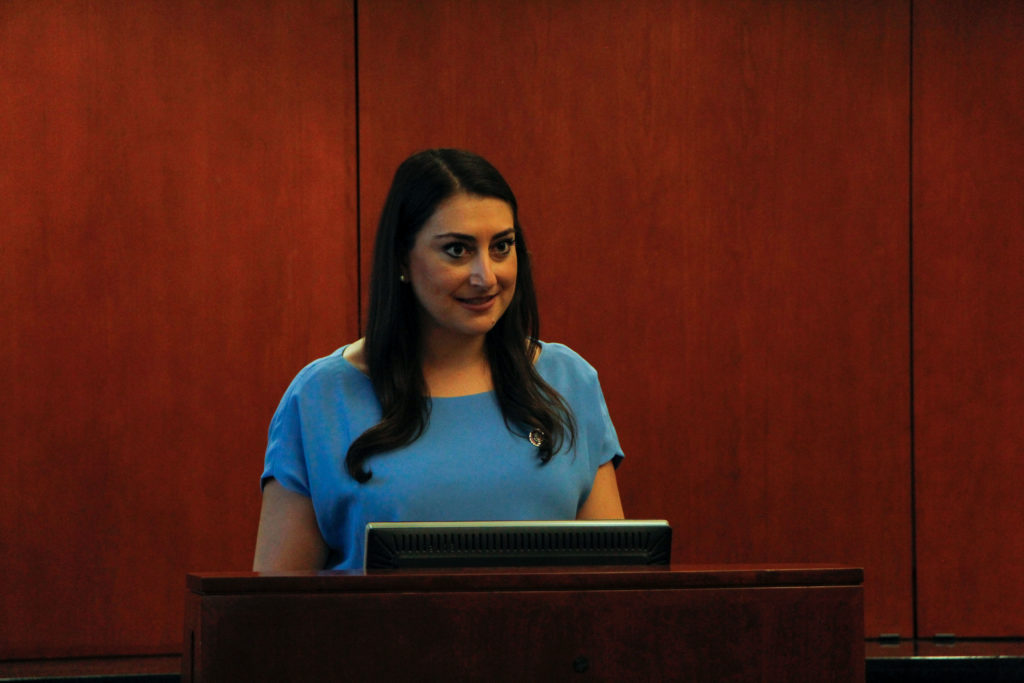A panel of law, reproductive and equity experts spoke about the growing importance of reproductive data privacy in the wake of the Supreme Court overturning Roe v. Wade.
The panel discussed Dobbs v. Jackson Women’s Health Organization and how the new ruling overturning federal abortion protections will affect data privacy at a talk Tuesday. The Ethical Tech Initiative of DC at The George Washington University hosted the event, which was moderated by Maya Arigala, a third-year GW Law student and the founder of the Reproductive Data Privacy Initiative within Ethical Tech.
U.S. House Rep. Sara Jacobs, D-CA, who was introduced by law school professor Dawn Nunziato, spoke about the urgency of protecting reproductive data privacy in her keynote address at the event. Jacobs is the sponsor of the “My Body, My Data” Act, a bill aiming to “establish protections” for personal reproductive or sexual health information.
“This conversation couldn’t be more important, and it couldn’t be more important to be having right now,” Jacobs said. “Because when the Supreme Court threw out nearly 50 years of precedent and the constitutional right to abortion, I don’t know about you, but I was so angry, I was literally shaking.”
India McKinney, the director of federal affairs for the Electronic Frontier Foundation, said while period trackers may seem like the most obvious risk to reproductive data privacy, data could be tracked through the user’s social media posts, browsing history and location on their cell phones.
“The critical thing is it knows where you went a year ago, two years ago, 10 years ago because the companies hold on to that data forever because why wouldn’t they?” McKinney said.
McKinney, whose own experience with government work includes her ten years of Capitol Hill, said life in post-Dobbs America may leave many feeling helpless against the power of big tech companies and those who seek to criminalize people looking to protect their reproductive health. But, McKinney also referenced how working with local governments and building from the ground up can help to challenge those forces.
“So if you are looking at actually making a difference in people’s lives, you should definitely get involved at the lowest possible level,” McKinney said. “Local government is a very special thing.”
Jake Laperruque, the deputy director of the Center for Democracy and Technology’s Security and Surveillance Project, discussed a new law passed in California stating companies are not allowed to turn over information for an abortion investigation, highlighting important legislative measures that state governments can take to protect reproductive data privacy.
“Now that law applies only to companies that are based in California and to handing over information in California,” Laperruque said.
Sara Geoghegan, a law fellow at the Electronic Privacy Information Center, said the state of New York may soon pass a similar law and expressed her belief that restrictions on the exchange of private data should be placed on tech companies and other organizations.
“I think the data minimization standard that has been discussed should also apply to vendors, service providers and other third parties with which tech companies share our data,” Geoghegan said.
Carmel Shachar – the executive director of the Petrie-Flom Center for Health Law Policy, Biotechnology and Bioethics at Harvard Law School, who also joined via Zoom – said because of the way the tech industry uses personal information and data as a commodity, she is recommending precautionary measures like avoiding searching for information on reproductive care to people who don’t want it to be used against them.
“I think one thing as a health lawyer who deals with data privacy that I’m really struck by is that very often, the technology industry does not have the same approach to data sharing and data privacy that the healthcare industry does, because it’s an industry that has been built on data as a commodity and data for sharing,” Shachar said.











